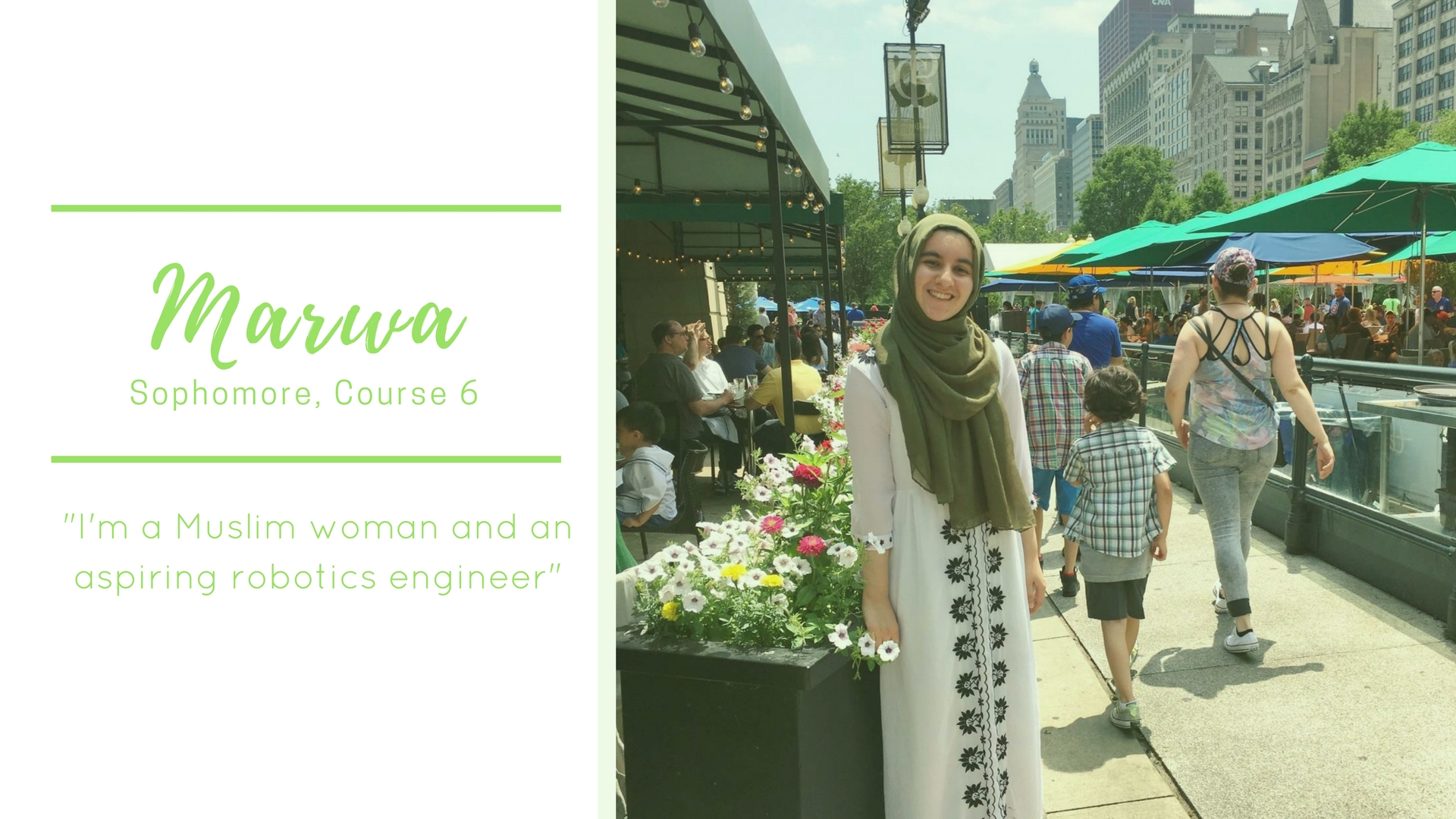I’m a Muslim Woman and… by Afeefah K. '21
on this #MuslimWomensDay, meet some p cool ppl
What day is it?? It’s March 27th. Which means two things. Happy Birthday Dad! And also Happy Muslim Women’s Day! I’ve been toying with the idea of blogging about the Muslim community at MIT for a while now. To be honest, I didn’t quite know where to start. Do I talk about the Muslim Student Association? Do I talk about the prayer space that’s a short walk away from my dorm? Do I talk about the halal food that’s served in McCormick’s dining hall? Or do I talk about how safe I feel walking down the Infinite in my hijab?
When I found out about Muslim Women’s Day, I immediately knew that this was the perfect opportunity to make a blog post. I can’t think of a better way to showcase the Muslim community than through some of the most amazing women I’ve met at MIT. Throughout the past year, they’ve become my closest friends, my shoulders to cry on, my philosophical raconteurs, but most importantly my role models. Through a series of questions and answers, these women discuss their passions, their dreams, their day-to-days and what it means to be a Muslim woman at MIT.
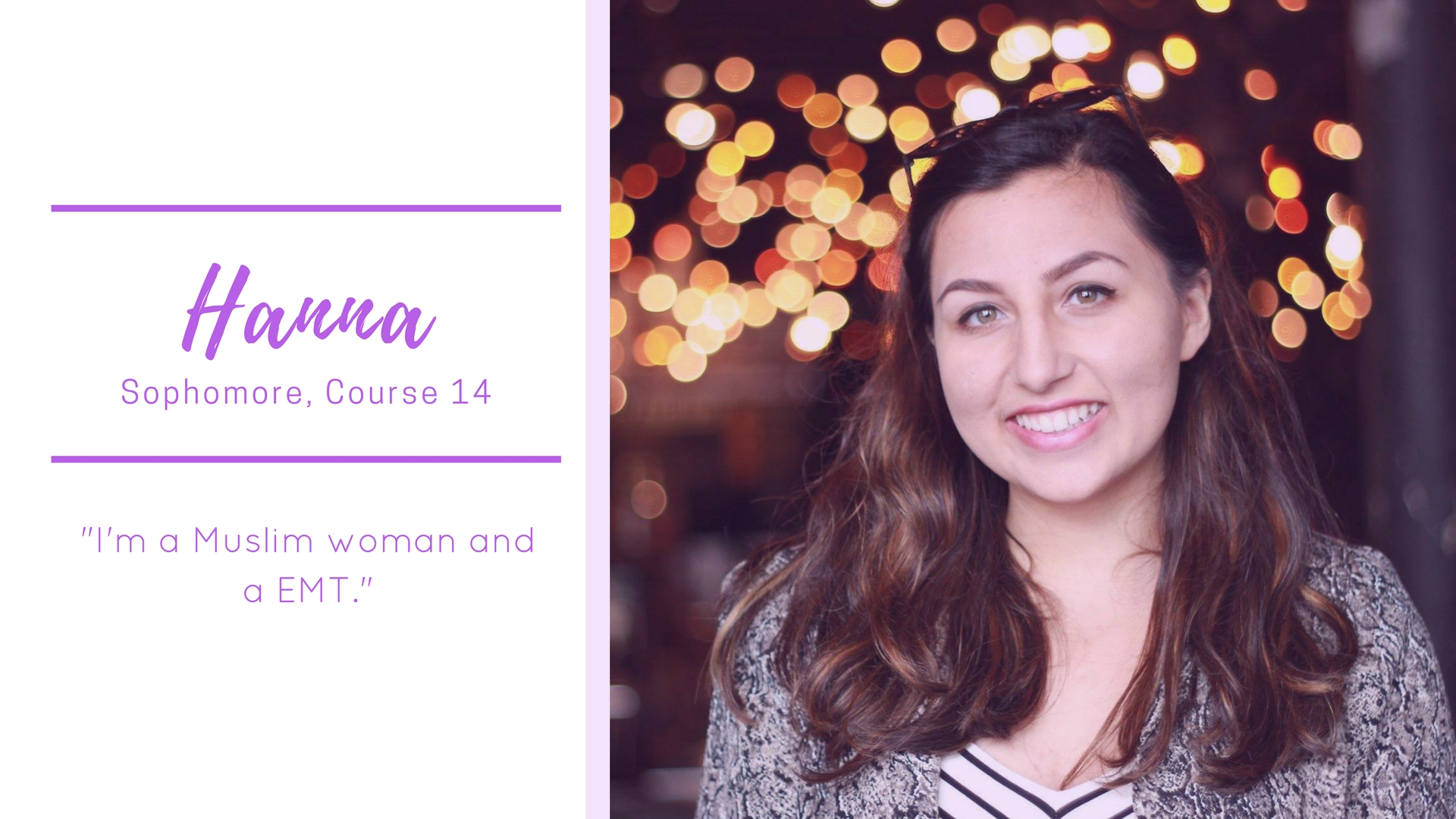
What is a Muslim?
“To me, being Muslim is not something that is observable. I don’t think you can detect a Muslim by just looking at a person, because faith is something that is very much within a person. It is in the way one acts and carries themselves. When surrounded by people who’ve had limited interactions with Muslims, I’m the representation of something they have only seen in the media. And it’s interesting, because often time people get to know me, and then learn about my Islam due to my outward appearance.”
What stereotypes are you defying?
“Afghan girls don’t tend to leave home for college. And just coming all the way to MIT from Chicago was a physical distance people weren’t expecting.I was admitted off of the waitlist. At that point, I was kind of jaded with college admissions in general. I had actually committed to Cornell, I had done all of the paperwork, I had found a roommate. And then I got adMITted. And it’s what I’ve always wanted. I really like that everyone is a nerd here. When you’re surrounded by people who enjoy the things you do, it’s different. Your personality doesn’t solely depend on being smart. And that pushes you to explore other things about yourself. It makes for a richer human being”
What pulls you out of bed in the morning?
“My 9:30 am class. But actually, there’s just so much to do. In a literal sense, there are so many opportunities here. If I don’t check my email, I’ve missed at least three whole life experiences. But also, there’s this constant flow of possibility and it kind of makes you feel bad if you miss out.”
What is your proudest life achievement?
“Voted Most Likely to Win the Lottery and Lose the Ticket”
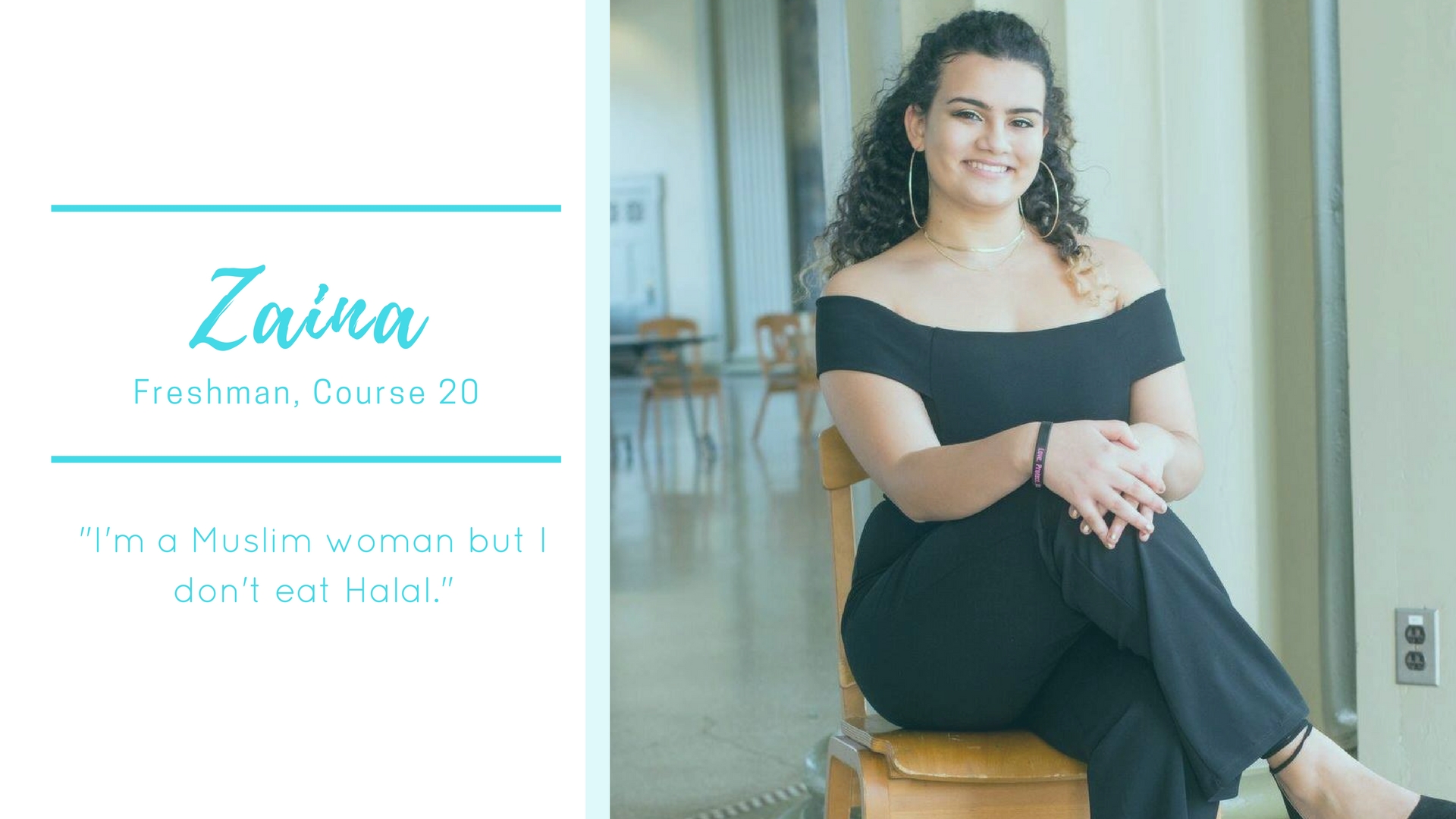
What do you wish people knew more about Muslims?
“It’s such a diverse population. And people narrow us down, because we have to look a certain way. A large percentage of the Muslim population is actually from Indonesia and there’s people throughout the world that are Muslim. Your religion doesn’t have to match your ethnicity or your race. And people don’t often make that connection.”
What would you consider to be the biggest misconception people have of you if any?
“That I am not Muslim, just because I dress a certain way or practice a certain way. I struggle with my identity on a day to day basis. Racially and religiously. I remember when I first came here, I was so worried about being a part of the Black Student Organization and the Arab Student Organization. I was worried how people would accept me. I was different, and I was worried I would be judged for that. I mean, I’m from rural Texas. It’s always in the back of my mind what people think about me. But I’ve never had a scenario where other people have made me feel out of place. They’ve all been very comforting and very accepting.”
What do you wish you could do more of?
“EVERYTHING. I wish I could watch more Indian Movies. There’s so many and they’re so good. Kabhi Kushi Kabhi Gham is a classic. But I just don’t have time. I’m guilty of Wikipedia-reading movies. I have full on conversations with people about these movies, but I’ve never seen them before. It’s a talent.”
What does the typical weekend look like?
“I pset. I watch movies. I like to eat. I’m in Dance Troupe. I’m a Tech Caller. I play volleyball on Sundays. I like to chill with my friends watching anime.”
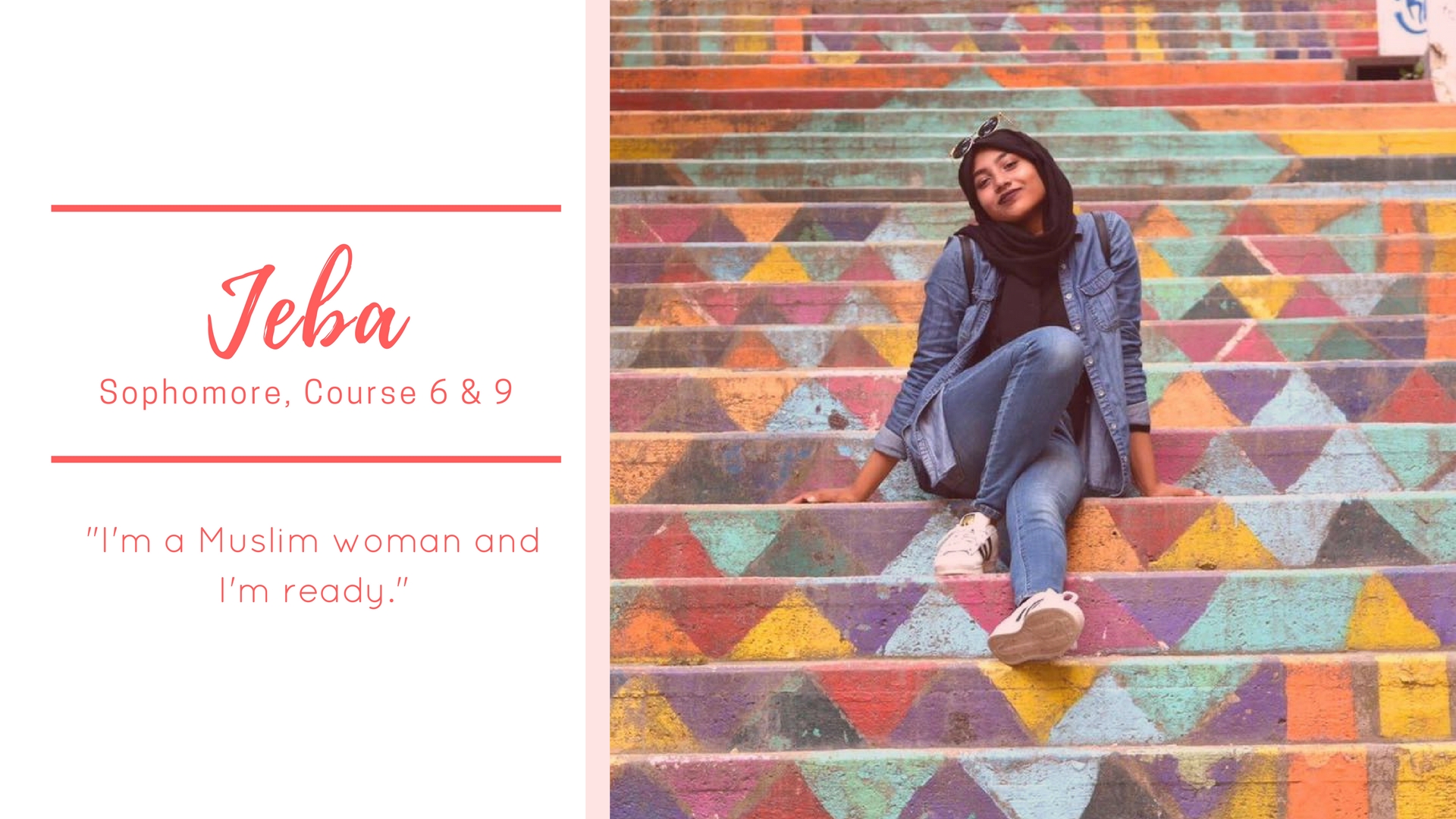
What defines you as a Muslim Woman?
“I think the hijab is a very interesting thing, because suddenly I’m someone who wears my faith on my head. I run into people and what’s the first thing they know about me? My most intimate beliefs. As I’m doing things, I know that the actions I’m doing reflect positive things among Muslim women. Among that being a STEMinist, being loud, being energetic. People should know that there is Muslim women representation at elite institutions and their voices are heard. There’s change coming and the people that are making those changes aren’t that far removed from them. We have our countries and our people in mind.”
How has being a part of the Muslim Student Association shaped your MIT experience?
“Oh my goodness, I think the MSA has defined my experiences. They have my back when I’m hundreds of miles away from my home and my family. They’re there to mentor you, to make sure you succeed in the ways you want. They’re there to make sure your healthy. I’ve had friends that have taken each other to the hospital. I’ve gone to friends’ homes in other countries. I think the most memorable experience I’ve had has to do with the elections. It was a very scary time for Muslims and minorities. And I remember we were all watching and we didn’t know what Florida would do. We were in such an intense state of fear. And there were 50 of us in a room. And people were scared, some of us were crying. Some people haven’t been able to go home since. But sharing that experience with the MSA pulled me through. And that’s a support system I wouldn’t trade for anything.”
Where do you see yourself in the future?
“As a part of my understanding of my religion, I don’t believe in coincidences. I don’t believe in faith and predestination. So I think there is some other force, you can call it the universe, you can call it fate. There has to be a reason that someone like me, who is only generations away from poverty, someone like me who is a Muslim when Muslim countries are suffering, someone like me who is low-income and someone like me who is a child of immigrants, there is no other explanation for where I am. I was born in the most advanced of times, in the most advanced of countries and am attending one of the most advanced universities in the world. I can’t tell you how weird it is. Going from volunteering at food banks and handing my own mom a crate of food to being at MIT. My dad still hangs up my admission letter at his business. When I got into MIT, he said he would sell his business for me. He was willing to give it all. So I don’t believe in coincidences. I have a duty to society and I feel this huge overwhelming sense of purpose.”
What is your favorite piece of clothing that you own?
“In the fall I was really into fur vests. I didn’t even mention how fashion impacts my life as a Muslim woman! Usually, I put a good amount of time into choosing my outfit for the day. And as a hijabi, you can’t just throw on a startup t-shirt and a cardigan. No, girl. What if your hijab doesn’t match? So you have to be on top of your game all the time. I love clothes in general, I have a huge closet. When I moved to Simmons, I asked for a second one, but they said no. I really like playing it up with my hijab and matching my makeup to it. It gives me a lot of joy in the morning. And I don’t think being hijabi means you have to be monochromatic and dimensionless. I believe that as Muslims, we should broadcast our personalities.”
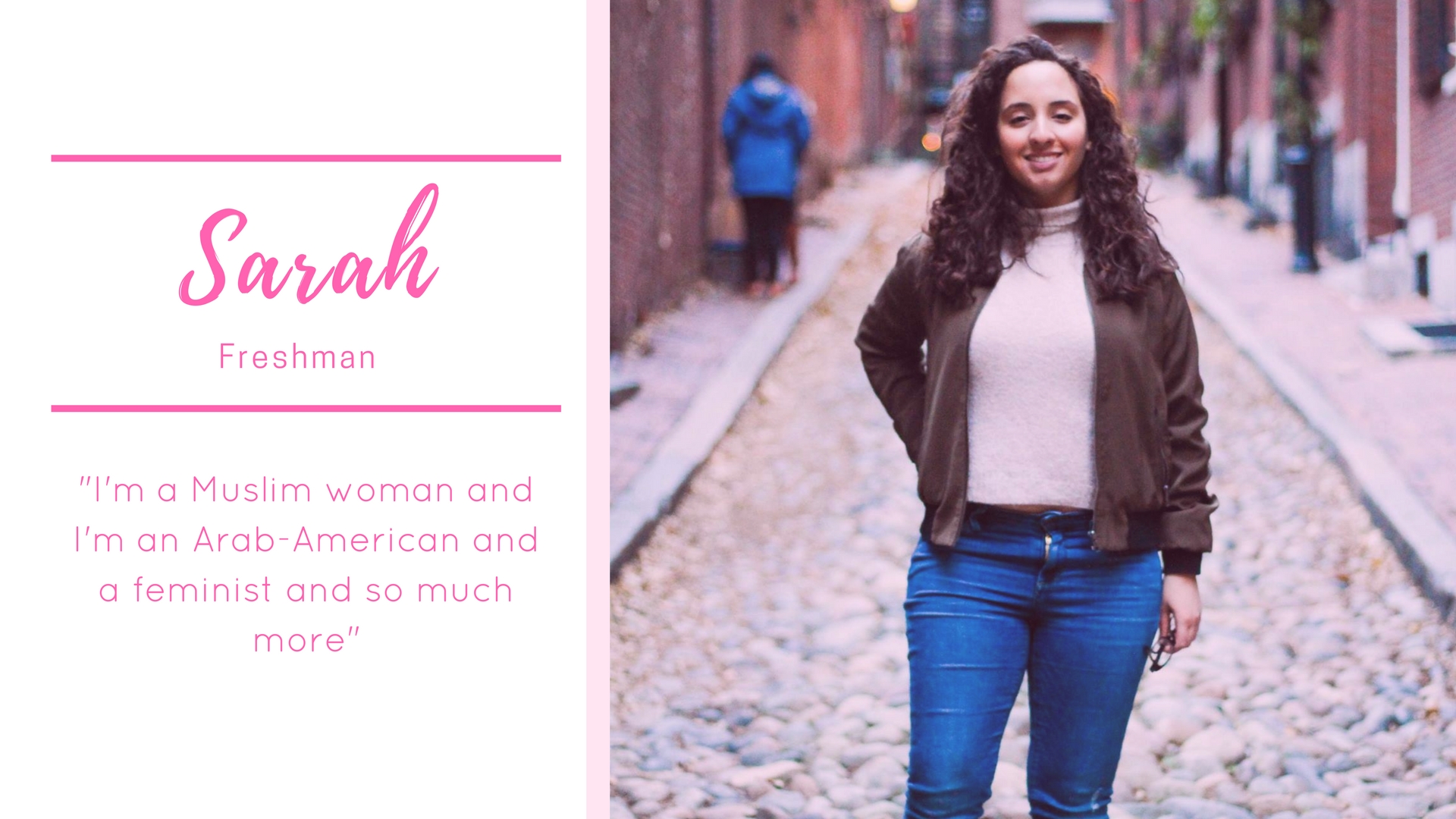
What defines a Muslim woman?
“I think what makes each of us unique is our experiences and the perspective we gain from them. This in turn affects what one believes/values. Personally, a lot of my defining experiences have had to do with being Muslim and/or being a woman. Obviously there’s more to a person than just those two things, but these parts of my identity have greatly affected my perspective from a young age.”
How do you practice your faith?
I mainly practice through prayer and reading the Qur’an, but my favorite time of year is definitely Ramadan. Fasting during Ramadan always grounds me— it makes me more grateful for what I have. I also practice by celebrating Eid and staying active in the Muslim community, especially the MSA. Growing up, there wasn’t a prevalent Muslim community in my hometown and so it’s been a blessing to be surrounded by such an awe-inspiring community.
If you could live in a movie what movie would it be?
“Harry Potter— I know that’s a series, but they all take place in the same Wizarding World that I fell in love with as a child.”
How do you destress at MIT?
“There are so many ways to destress— I think it depends on how I feel. Sometimes destressing means hanging out with friends, an outing in Boston, calling my friends and family from back home, watching Netflix or an extra workout at the Z.”
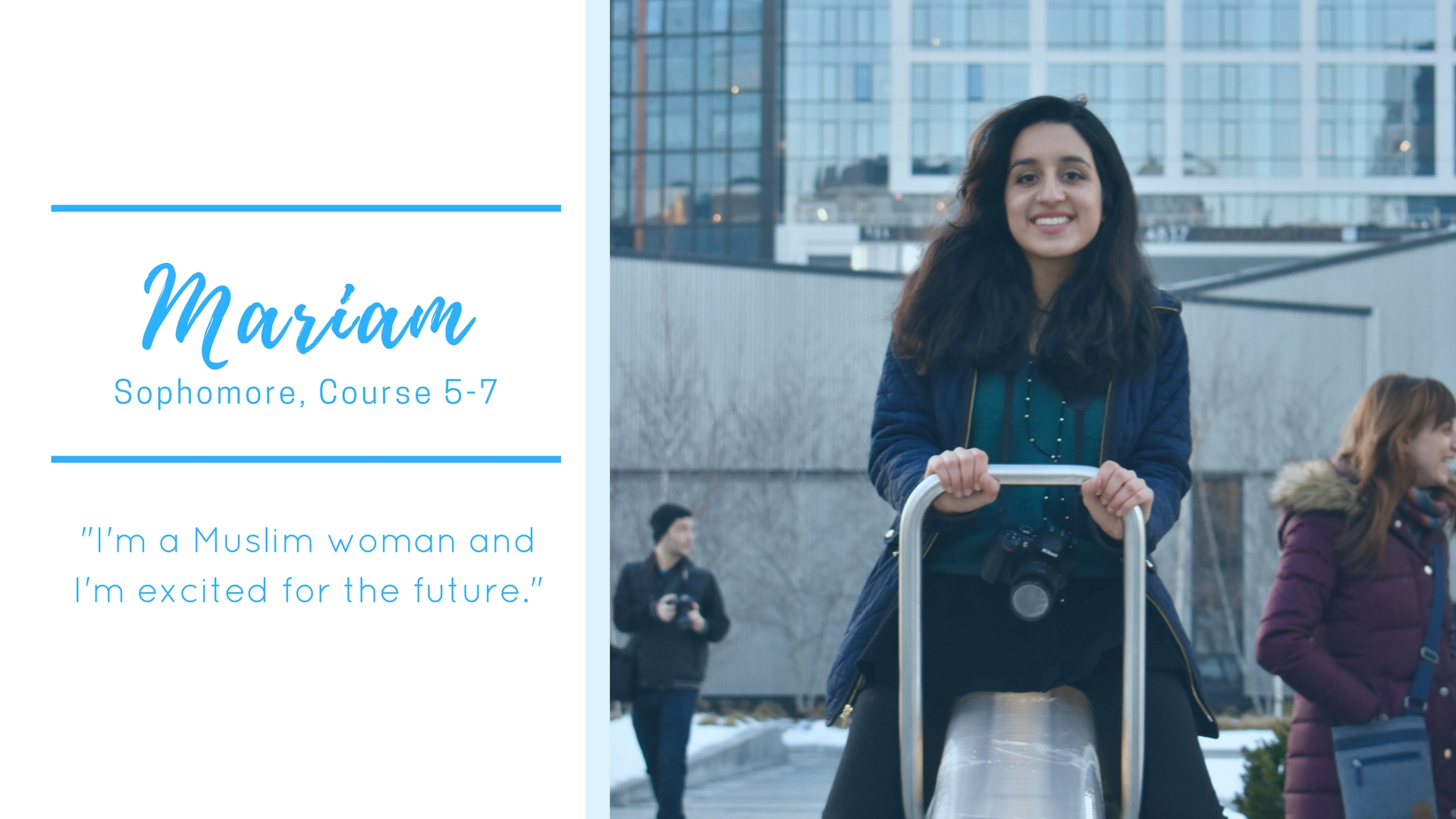
How does being a Muslim woman impacted your day-to-day life?
“I think the biggest impact I feel on a daily basis from being a Muslim woman comes more from just being Muslim. I think my faith empowers me and gives me a positive outlook and a sense of greater responsibility that really helps me get through and reframe the hardships here at MIT.”
What’s the last rule you broke?
“The last rule I broke is not actually a written rule but is unfortunately sort of a general expectation of old white men in the legal system. In mock trial, we have to suit up and face other teams in the courtroom. Sadly, a couple of times, both female and male judges have advised us after a round that female litigators generally should wear skirts and pantyhose rather than pants. Honestly, I think that’s such a stupid suggestion. The boys wear pants. You should be focusing on the arguments I’m presenting and the case that is being debated, not my calves. So yeah, I wear pants. And if one day I want to wear a skirt and tights, I would. I’ll wear what I’m comfortable in, and I’m not going to wear anything different because you tell me so.”
Recently, many Muslim women have been gaining popularity. Examples include Ibtihaj Muhammad and Linda Sarsour. What does this mean to you?
“It’s really great to see Muslim women rise to the spotlight. It’s kind of unfortunate that it seems to be only Muslim women who break the “Muslim women stereotype” becoming famous, but I guess it’s necessary at this point. So many of my Muslim female friends are people whose qualities I admire and it’s great to have role models excelling in things like sports and advocacy. It’s a great reminder to always aim for the best that we can do and that there’s a community of people like us. Especially with all the negativity about our religion we face on a day to day basis. It saddens my heart when I think about it. It’s really refreshing to see strong Muslim female figures breaking stereotypes.”
If you could spend a day in someone else’s shoes, whose shoes would it be?
“Wow that’s a tough one. Honestly, I have so much admiration for Sonia Sotomayor. Especially given her background and how she now has such an important role on the Supreme Court, which is still mostly men. I would love to spend a day in her shoes (and hopefully not mess anything up).”
What’s your hijab story?
I began wearing the hijab at the age of 8, very much clueless as to what it meant in a post-9/11 world. At the time, I went to a very sheltered Islamic school in Seattle, W.A. where most girls wore the hijab in school as part of the dress code — but for some reason, I decided to continue to wear it on a regular basis. I felt so comfortable with my hijab that my mother had to force me to remove it right before going to bed. When you’re a little kid, you are oblivious to the scores of people staring at you as you run with your two-piece hi ajab and awkward fashion sense through the aisles of Costco or bike through the neighborhood with your friends. All in all, the hijab had become an integral part of my identity even before I realized the consequences of my decision and the message it conveyed to those around me.
Since Seattle, I moved to Lorton in Virginia, Doha in Qatar, Dubai in the UAE, Holmdel in New Jersey, and finally Cambridge in Massachusetts, where I now attend MIT as a sophomore. In some places more than others, I’ve faced enormous barriers in developing relationships with teachers and peers, finding modest sportswear to play the sports that I loved, and gaining access to resources in my interests. It was in middle school when I was forced to consider what my motivations were in wearing the hijab as a result of being in an environment, where Muslim girls began to remove the hijab at the pressure of peers. Instead of believing it to be an impediment to my success, I viewed it as a source of empowerment and liberation to focus on my inner identity. I swam & played basketball on the school teams without sacrificing my headscarf. Despite the tremendous social weight it carried, I debated at Model UN Conferences. I did not give up, refusing to believe in the bizarre idea that a piece of cloth covering my hair should dictate my success at friendships, academics or sports. Modesty had become my form of empowerment and through it I found people who appreciated the ideas thriving in my head rather than what I wore on top of it.
Has being a Muslim woman ever been an obstacle to things you’ve wanted to achieve?
For some reason or the other, Allah (God) had placed a fierce determination and belief in my heart in times of distress to not give up on my hopes and aspirations. In high school, I definitely felt isolated being the only girl wearing the headscarf while being on the track team/basketball team or taking part in science leagues. Even now as a college student applying for internships in the software development industry, there is always a nagging feeling in my mind that I might not get the job solely based on that piece of cloth I wear on my head. There are definitely times where people do brush off my ideas or assume parts of my personality without even getting to know me. But with patience and belief in Allah’s will, I know that only He will help me find a way to succeed with my beliefs and morals fully intact.
What fuels you?
I wear the hijab proudly, for it clearly identifies me as a Muslim woman who is proud of her faith. With a surge in hate crimes and new legislation being passed against people like me, I know there will always be the uncertainty of a peaceful future in this country I call my home. Yet instead of complaining of the negative portrayal of the hijab in the media or living in fear of a potential Muslim immigration ban, I’ve learned to embrace and make the most of my situation, because nothing will change unless I do something about it. I am excited by computer vision, robotics, autonomous vehicles, and machine learning, and I am fueled by a desire to exploit these technologies to help the underprivileged in India, Syria, and beyond. My ideas in this sphere span from reducing congestion in overcrowded trains in places like China and Bangladesh or making urban life healthy and sustainable by reducing pollution.
I fully intend to pursue my dreams with unflinching faith in my Creator who will protect me and make me stronger with every obstacle to my way of life.
You have a golden ticket in your hand, it can take you anywhere. Where do you go?
I would probably go back in time to when my grandmother was a little girl in her remote village outside of Chennai, India and teach her the math & science skills to get into a university such as MIT. She is a brilliant woman who is probably way smarter and quicker in math than I am, so I often wonder what she would have accomplished had she been given the opportunities and diverse experiences I have today. I am sure that together, we would create technologies that would enable us to extend the human footprint into Mars or even Jupiter!
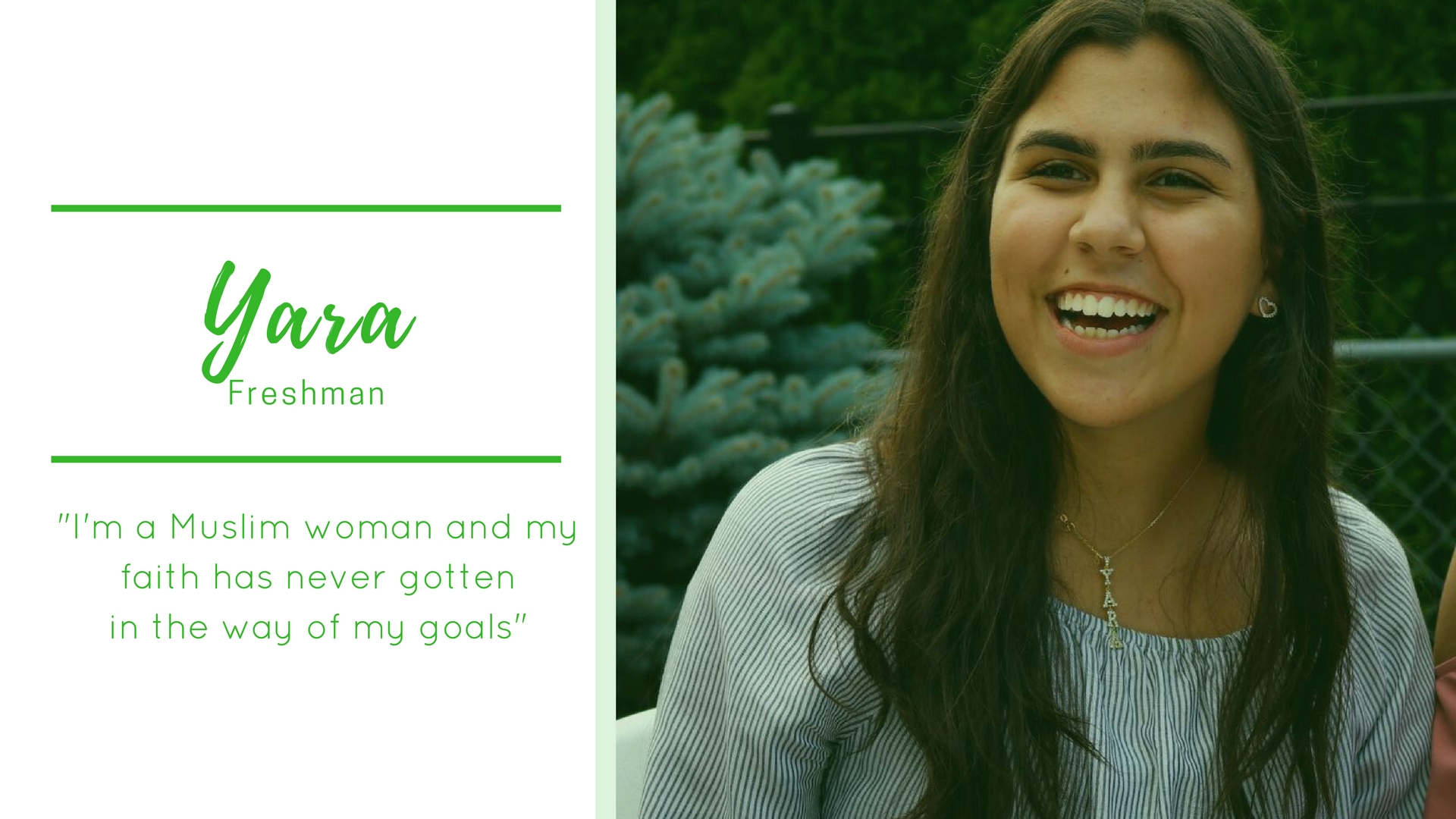
How has faith shaped your MIT experience?
“Before coming to MIT I assumed being Muslim on a college campus was going to be very difficult. Will it be hard to make friends? What stereotypes did my classmates come in with? Was I going to feel out of place at major social activities? However, once getting here, I realized this was completely not the case. Everyone I have met has been very welcoming and understanding about my faith (which is how it should be). One of my favorite moments on campus goes way back to the very first week of college. One of my friends offered me a jelly snack. I didn’t want it, so I turned her down (context: most of these snacks have pork gelatin, which is forbidden in Islam). However, another friend on the other side of the room calls out to tell me that there isn’t gelatin in the snack if that’s why I had said no. In that moment I realized that I had people who weren’t Muslim and still understood where I was coming from. They were aware of what I did and didn’t do. And supported me through all of it.”
If you could choose only one song to play every time you entered a room for the rest of your life, what song would it be?
“At least for my time at MIT, I would no doubt choose “If I were a boy” by Beyonce. I didn’t choose this song for the emotional aspect, but more because of how much it makes my roommate laugh whenever I try to sing it. The high notes are ridiculous to hit if you’re a professional singer, so from me they’re just absolutely terrible. The easiest way to lighten up a pset session is have me belt this song out!”
What stereotype do you hate the most?
“I hate the idea that women are oppressed by their religion. Many of the times the images that emerge regarding Muslim women are cultural rather than religious representations. As a Muslim woman myself, religion has never gotten in the way of my success and my dreams. Prophet Muhammad (pbuh) said “seek knowledge even unto China” which is a quote I have lived by and has empowered me rather than held me back.”
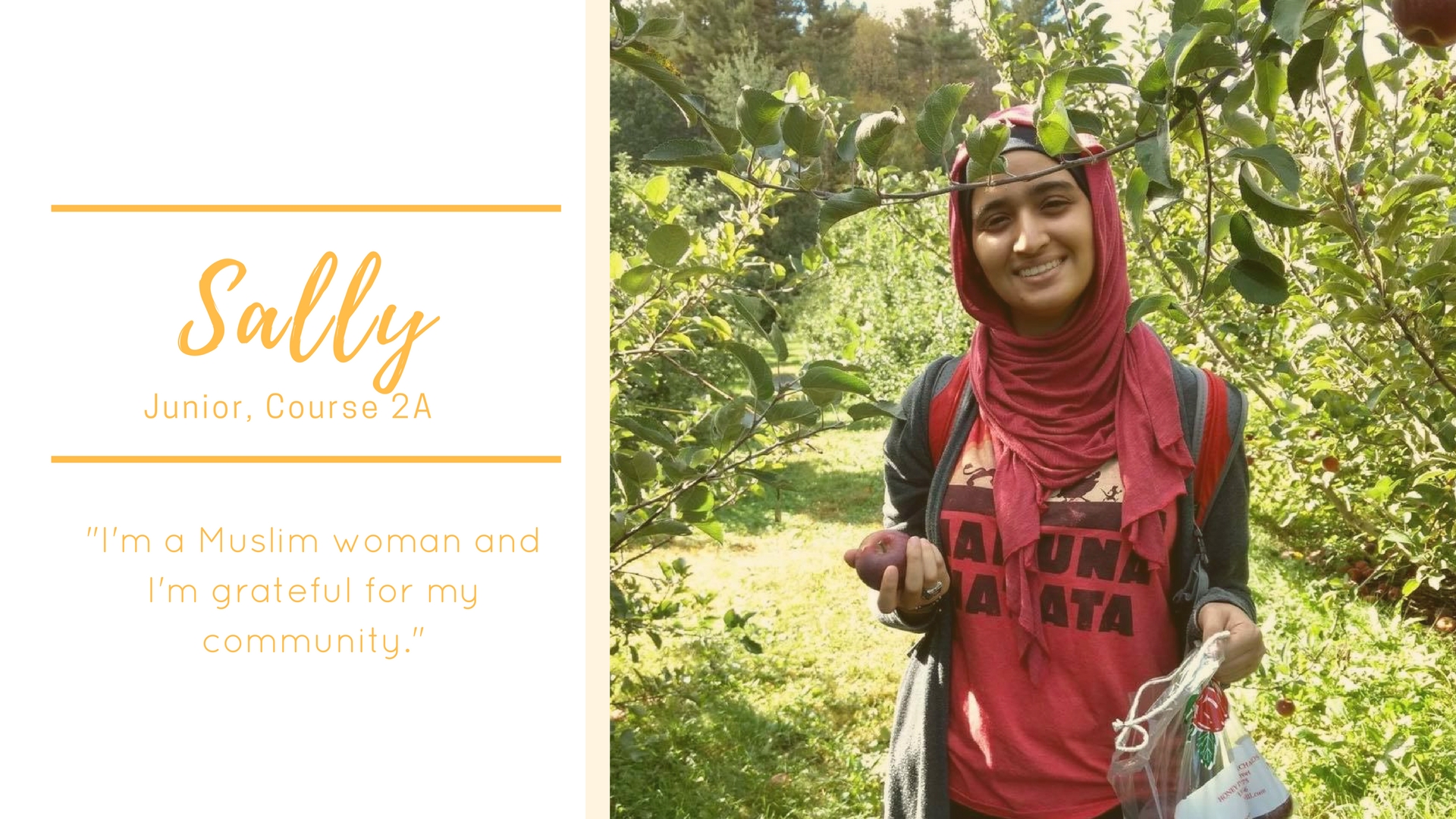
How does being a Muslim woman guide your plans for the future?
“So my plans for the future are almost in constant flux because I’m constantly learning what I’m actually passionate about, but my faith helps keep me grounded when I start to worry about making the right decisions. It’s always comforting to know that things will work out for the best inshaAllah, even if it’s not necessarily how I thought they would.”
What does hijab mean to you?
“Hmm this question is a little difficult because I always feel like I’m leaving something out. I guess other than being a symbol of my faith, my Hijab also forced me to face my fears, as cliché as that might sound. I decided to start wearing the Hijab the summer after my freshman year at MIT. Coming back to school in the fall, I of course didn’t have any concerns while on campus, but I noticed a fear nagging at the back of my mind whenever I went off campus that I might run into the wrong people. In those situations, I learned a lot from how I saw other Muslim women who had grown up in the US go about their lives and eventually learned to wear my Hijab with pride and pray for the best.”
What’s your hidden talent?
“I guess the first thing that comes to mind is my extensive knowledge of Disney movies, DreamWorks movies, and other movies, books, and video games from my childhood. I honestly surprise myself sometimes and wonder if there’s a way to replace at least some of this info with stuff I need for class lol. (That’s not to say I don’t use this knowledge every chance I get, I quote Disney whenever I get the chance).”
Looking back at your past week, what is a moment that sticks out?
“ On Friday, I finished my organic chemistry exam and spent much of the afternoon working in one of my favorite spots on campus, on the second floor of Hayden. Around 6 PM, I went to Berryline on Mass Ave and got some froyo with some friends. After chatting for around an hour – laughing as we discussed potential housing plans for next years and our favorite memes from freshman year – we went to the Harvard Bookstore and browsed the books there, which is one of my favorite things to do. I found a copy of a children’s book I’d lost sometime in middle school and haven’t been able to find since in the used book section (it’s about a girl and her dog and I remember learning that Sirius was the name of a star from that story). I’m very excited to reread it. After coming back to McCormick, I stopped by one of my friends’ room to talk for a bit then did my laundry while stopping by the Marvel Movie Marathon that was happening in the game room between cycles. Nothing incredible really happened that day, but I feel like most of my favorite MIT memories are just compilations of small happy moments. Overall, by the time the night ended, I’d already forgotten how stressed I’d been in the morning before my exam and was happy to be surrounded by awesome friends I can have so much fun doing simple things with.”
 The takeaway from this is simple: there is no template definition for what a Muslim woman should be. Even in this day and age, being a Muslim woman comes with a set of labels and expectations. But if there’s anything I ‘ve realized in the past year or so, it’s that a Muslim woman, just like anyone else, is so much more. She is more than a Muslim and a Woman. She has her own quirks and eccentricities. She is fierce. She is eloquent. She is passionate. She hopes to make today better than yesterday. And most importantly, she is all of that in her own unparalleled way. And that’s beautiful.
The takeaway from this is simple: there is no template definition for what a Muslim woman should be. Even in this day and age, being a Muslim woman comes with a set of labels and expectations. But if there’s anything I ‘ve realized in the past year or so, it’s that a Muslim woman, just like anyone else, is so much more. She is more than a Muslim and a Woman. She has her own quirks and eccentricities. She is fierce. She is eloquent. She is passionate. She hopes to make today better than yesterday. And most importantly, she is all of that in her own unparalleled way. And that’s beautiful.
